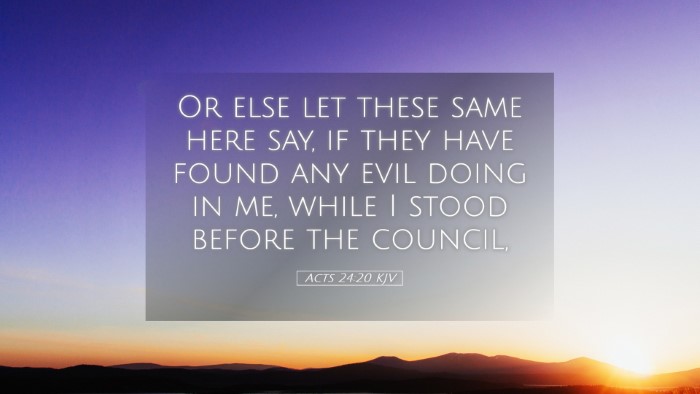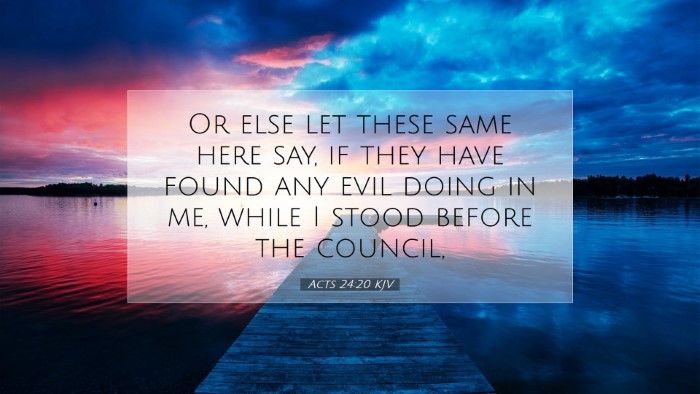Old Testament
Genesis Exodus Leviticus Numbers Deuteronomy Joshua Judges Ruth 1 Samuel 2 Samuel 1 Kings 2 Kings 1 Chronicles 2 Chronicles Ezra Nehemiah Esther Job Psalms Proverbs Ecclesiastes Song of Solomon Isaiah Jeremiah Lamentations Ezekiel Daniel Hosea Joel Amos Obadiah Jonah Micah Nahum Habakkuk Zephaniah Haggai Zechariah MalachiActs 24:20
Acts 24:20 KJV
Or else let these same here say, if they have found any evil doing in me, while I stood before the council,
Acts 24:20 Bible Commentary
Commentary on Acts 24:20
Verse: "Or else let these same here say, if they have found any evil doing in me while I stood before the council," (Acts 24:20, KJV)
Introduction
This verse occurs within the context of Paul’s defense before Felix, the governor. It encapsulates the essence of Paul’s challenge to the accusations brought against him. By referencing the council, Paul invites scrutiny upon the witnesses’ testimony, indicating a legalistic appeal that not only aligns with Jewish traditions but also highlights the values of fairness and justice vital in Christian teaching.
Exegesis and Analysis
Paul's rhetorical question serves multiple purposes. First, it acts as a defense against the charges leveled by his accusers, primarily the Jews who sought to discredit his ministry. Second, it underscores his commitment to truth and transparency before the governing authority. The thrust of his argument is that if any wrongdoing had been done on his part, it should have been demonstratively proven by those present, which none had accomplished.
Matthew Henry's Commentary
Matthew Henry emphasizes the noble stance of Paul in this trial. He interprets the verse through the lens of integrity and a clear conscience. According to Henry, Paul’s appeal to the council reflects a reliance on a higher moral standard, asserting that justice must not only be done but must be seen to be done. The silent acknowledgment of the accusers' failure to substantiate their claims serves as a testament to Paul’s innocence.
Albert Barnes' Commentary
Albert Barnes adds layers to the understanding of Paul’s situation, as he frames it within the judicial system of the time. Barnes notes the procedural element of Paul’s defense, highlighting the improbability of his accusers remaining mute on critical charges if they held any merit. Thus, the lack of definitive evidence presents a logical argument in favor of Paul’s position, stressing the importance of evidence in any judicial context. Barnes also points out the significance of the term “evil doing,” linking it with moral conduct expected of church leaders.
Adam Clarke's Commentary
Adam Clarke’s interpretation further asserts the significance of the council within the heritage of Israel. Clarke provides historical context, noting that Jewish law required witnesses to prove accusations beyond a reasonable doubt. He expounds on the idea that Paul's insistence on the absence of any charges is not merely a denial but an assertion of his mission’s integrity. Clarke suggests that Paul’s ability to stand confidently before a powerful figure like Felix illustrates the power of divine assurance in the lives of believers amid persecution.
Theological Implications
Paul’s challenge to present any evidence of wrongdoing is reflective of a broader theological principle: the importance of maintaining one’s integrity in the face of accusation. This verse teaches pastors and theologians today about the significance of upholding truth within personal conduct and in ministry. It challenges leaders to remain unassailable by upholding a life characterized by holiness and dedication to God’s work.
Integrity in Leadership
In every aspect of church leadership, the example of Paul suggests that integrity is fundamental. As outlined by both Henry and Clarke, believers must strive for a witness that upholds the Gospel. Leaders today can glean from Paul’s example that when beset by conflict, the clarity of one’s actions will often speak more powerfully than the harshest of accusations.
Justice and Truth
The ecclesiastical implications of seeking truth within the judicial proceedings reflect a commitment to justice and congregational ethics. This must be a period of reflection for pastors and church leaders, focusing on the thoroughness with which they approach accusations and how they foster environments of transparency within their ministries.
Practical Applications
For students and scholars, this verse challenges the reader to consider the practical implications of ethical living in a complicated world. Are our actions defensible under scrutiny? Can we echo Paul’s challenge today, inviting examination upon our lives and ministries while remaining steadfast in our faith? This verse calls us to a deeper commitment to righteousness and integrity.
- Encourage Transparency: Leadership in a church setting should promote an atmosphere where questions and doubts can be addressed openly.
- Stand Firm in Faith: Just as Paul did, believers should not fear challenges to their conduct but should remain confident in their accusations.
- Advocate for Justice: Encourage congregations to ensure fairness and justice both within and outside of church governance, aligning with biblical principles of integrity.
Conclusion
Acts 24:20 serves as a powerful reminder of the necessity of integrity, justice, and truth in the life of a believer. Through the insights offered by Matthew Henry, Albert Barnes, and Adam Clarke, we gather a comprehensive understanding that informs our practice of faith and ministry. It reminds us that when we are rooted in truth and uphold a moral standing, we can face any accusation with a clear conscience, following the example of our Lord and apostle.


